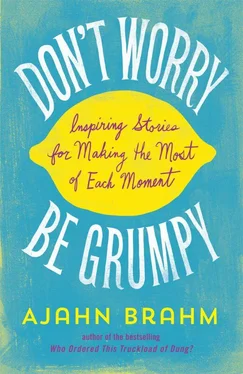They sat down on their cushions again, crossed their legs, placed the right paw carefully over the left paw, straightened their backs, closed their eyes, and resumed meditating with bananas in their mouths.
Of course, once all eyes were closed, the monkeys ate all their bananas, got up, and left. That was the end of their one-and-only meditation session.
Now you know why we humans have difficulty finding peace of mind. Most of us have monkey minds, which say:
I will just get this one thing out of the way first, and then I’ll rest.
That is why, as I mentioned in my previous book, the only place these days that you find people “resting in peace” is in the cemetery. And in the Buddhist monastery, of course!
In ancient times, it was easy to capture a monkey. The hunter would wander into a forest, find a ripe coconut, and cut out a small hole that was exactly the same size as a monkey’s fist. He would then drink the sweet milk and eat some of the soft flesh.
Having eaten, he would secure the empty coconut to a tree with a thick rope or leather strap. After placing a banana inside the coconut, the hunter would go home.
Sure enough, a monkey would discover that hollow coconut with a banana inside and try to pull it out. But the hole is only just big enough for a monkey to put in an empty fist. When his fist was holding the banana, he couldn’t get it out.
By the time the hunter returns, the monkey has been struggling for hours to get his fist out together with the banana. Seeing the hunter, the monkey tries even harder to get both his fist and the banana out.
All the monkey needs to do to escape is to let go of the banana. Then he can pull his hand out and run. But does the monkey let go?
No way! Because monkeys always think, “It is my banana. I found it. It’s mine!”
And that is how monkeys get captured every time.
It’s also how humans get captured.
Say your dear son dies and you can’t stop grieving over him. You think about him all the time. You can’t sleep or work. Why?
All you need to do is to “let go of the banana” and you can move on in your life without suffering so much.
But you can’t let go. Only because you think, “It’s my son. I gave birth to him. He’s mine.”
Mothers tell me that when they look into the eyes of their newborn child for the first time, they intuitively know that this is a being not totally made from the parents; it is a being with its own past and individuality, a visitor from somewhere unknown who has now entered their life. It is theirs to care for, nurture, and love… not to possess.
Unfortunately, many parents forget this over the years and start owning their children. So when it is time to let them go, they can’t. If only they had remembered that one person can never own another, not even one’s own child. Then they would never get captured like a monkey and suffer with grief.
To love someone is to one day let them go.
We often fear that if we let someone go, they will never come back. The opposite is often the case.
If you keep a bird locked in a cage, then one day, when you leave the cage door open by accident, the bird will fly away and never return.
Alternatively, if you keep the cage door open, ensuring that the cage is comfortable with a plentiful supply of good food, then the bird will fly away but always come back.
A young Australian Buddhist mother told me that her six-year-old son was so upset one afternoon that he pronounced in all seriousness, “Mummy, I don’t love you anymore, and I am leaving home!”
“Okay darling. I’ll help you pack,” the mother replied.
So she accompanied her little boy into his bedroom and helped him pack all the essentials, like his teddy bear, lucky pants, and Spiderman costume, into his little suitcase. Having packed the suitcase, mum went into the kitchen and made her son’s favorite sandwiches, placed them in a brown paper bag, and gave them to her six-year-old so he would not go hungry when he left home.
Standing at the open front door of their house, the mother waved her son goodbye, “Bye-bye, darling! Don’t forget to keep in touch!” The young child, carrying a suitcase in one hand and the sandwiches in the other hand, walked to the end of the short garden path, opened the gate, turned left, and walked off into his future.
Less than fifty metres later, the six-year-old was homesick. He turned around, walked back to the gate, and ran the short distance to the door of his home and into the welcoming arms of his mother, who hadn’t moved.
That was a very wise mum. She knew her little six-year-old wouldn’t go far from a loving home.
When I told that story to a psychologist from Singapore, she couldn’t stop laughing. After she had pulled herself together, she explained that almost the same thing had happened to her when she was a very young girl. She had an argument with her mother when she was six and demanded to leave home. Her mum immediately agreed and helped pack her bag. This young girl didn’t receive any sandwiches, however. Her mum gave her ten Singapore dollars to buy her own lunch! Her mum then accompanied her to the elevator, as they lived in an apartment block. The elevator arrived, the six-year-old girl stepped in, and the mother waved her goodbye as the elevator doors closed.
This young girl did not even make it outside the elevator before she became homesick. By the time the lift had reached the ground floor, she missed her mummy and her home terribly. She pressed the button for the floor on which she lived. When the elevator doors opened, mum was standing there with open arms. “Welcome home, darling!”
When the bonds of love are strong, you can let people go, knowing with certainty they will come back.
In the days before reliable aircraft, most people would travel from continent to continent on huge, ocean-going passenger liners. When the ship was about to cast off, the passengers would line the ship’s decks next to the pier, on which their relatives and friends stood. As the steam horn sounded the departure, both waved, blew kisses, and shouted their last goodbyes as the ship slowly moved away. Soon, the boat was too far away for those on the pier to distinguish who was who in the grey mass of passengers still standing on the decks, but still they would wave and gaze. A few minutes later, the loved ones still remained on the pier, staring at the ever-diminishing ship, somewhere in which was their loved one.
Then the boat would reach that defining line, the horizon, and disappear totally. Yet even though the relatives and friends on dry land could not see their loved one anymore, let alone speak with them or touch them, they knew that they had not disappeared totally. They had just gone over a line, the horizon, that separates us from what is beyond. They know that they will see them again.
The same can be said to happen when our loved ones die. If we are lucky, we are by their bedside, embracing them and saying our last goodbyes. Then they sail off into the ocean that is death. They fade away from us. At their last, they reach the horizon, the defining line that separates this life from what is beyond. After they have passed that line, we cannot see them anymore, let alone speak to them or touch them, but we know that they have not totally disappeared. They have just gone over a line, death, which separates us from what is beyond.
We will see each other again.
The Frightened Water Buffalo
Water buffaloes in old Thailand were part of the family. They would live in the space below a villager’s house. They were usually so docile that little kids could safely go to sleep on their backs while the buffalo grazed lazily in the warm, idle months of the Thai hot season.
Читать дальше










